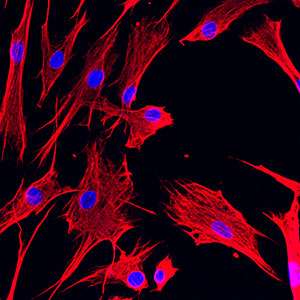Carcinoma-associated fibroblasts (CAFs)
(Medical Xpress)—A new paper by a team of researchers led by Zachary T. Schafer, Coleman Assistant Professor of Cancer Biology in the Department of Biological Sciences at the University of Notre Dame, offers important new insights into the role carcinoma-associated fibroblasts (CAFs) play in tumor biology.
A number of recent studies have revealed CAFs to be a major contributor to tumor progression through a variety of mechanisms. Despite this information, the precise role CAFs play in augmenting the growth of tumors is still poorly understood.
In their new paper, Schafer and his fellow researchers describe a critical role for CAFs in blocking anoikis, a cell death process that inhibits the spread of tumor cells to distant sites, through the secretion of insulin-like growth factor-binding proteins (IGFBPs). They revealed the precise molecular mechanism utilized by IGFBPs to inhibit anoikis: the stabilization of an anti-cell-death protein called Mcl-1.
"While cells present in the tumor microenvironment are now widely appreciated to actively contribute to tumor progression, our studies have unveiled a novel mechanism by which this can occur," Schafer said. "Therapies designed to hinder this role for IGFBPs might be particularly useful in slowing breast cancer metastasis."
Schafer noted, however, that additional pre-clinical studies are necessary to better understand which IGFBPs might be amenable to target and to determine the precise point during tumor progression that IGBFP inhibition could be effective.
The paper was published online on May 7 in the journal Molecular Cancer Research.
More information: "CAF-Secreted IGFBPs Regulate Breast Cancer Cell Anoikis." Kelsey J. Weigel, Ana Jakimenko, Brooke A. Conti, Sarah E. Chapman, William J. Kaliney, W. Matthew Leevy, Matthew M. Champion, and Zachary T. Schafer. Mol Cancer Res Published OnlineFirst May 6, 2014; DOI: 10.1158/1541-7786.MCR-14-0090
Journal information: Molecular Cancer Research
Provided by University of Notre Dame






















